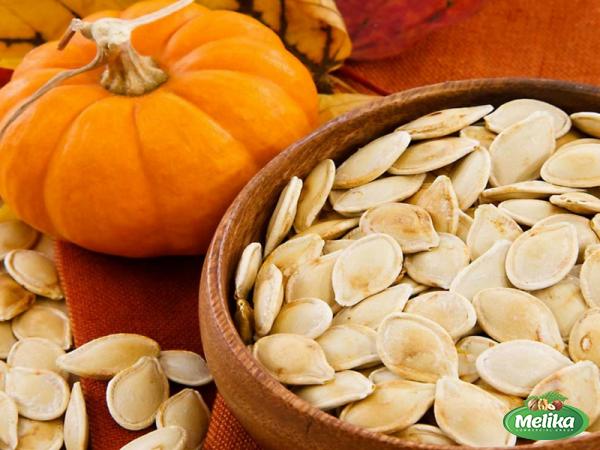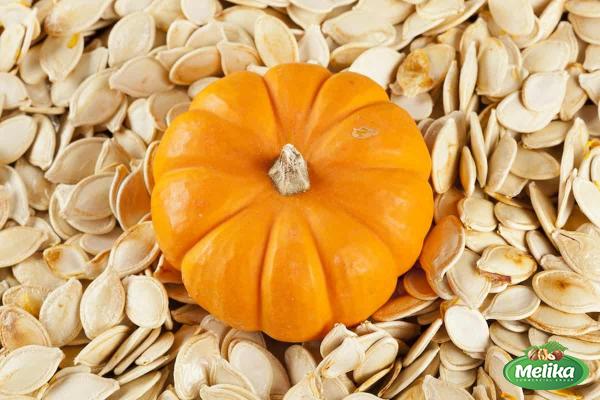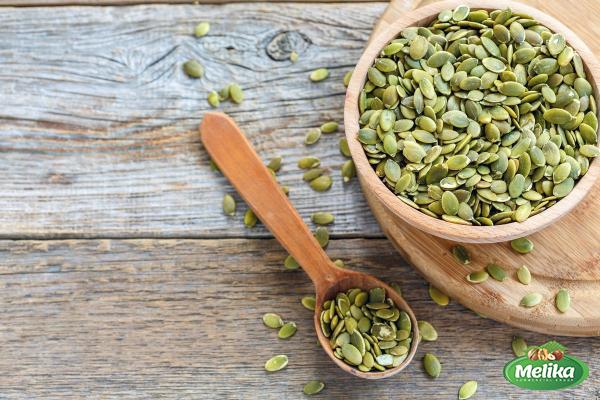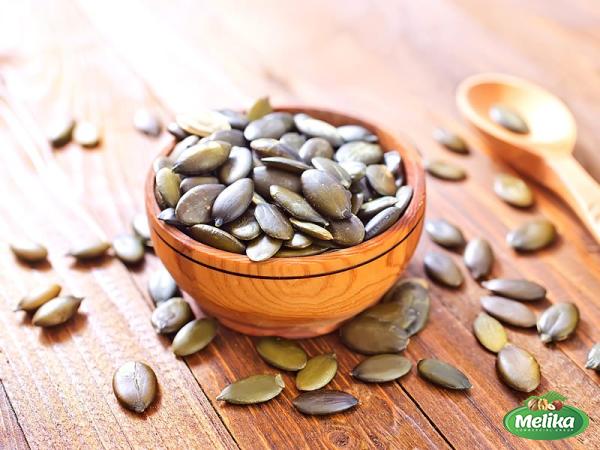Pumpkin seeds, also known as pepitas, are a highly nutritious and versatile snack enjoyed by people all around the world. These small but mighty seeds are packed with essential nutrients, including healthy fats, protein, fiber, vitamins, and minerals. In recent years, the demand for fresh pumpkin seeds has been steadily increasing due to their numerous health benefits. This article aims to introduce fresh pumpkin seeds, highlight their nutritional value, and provide insights into finding the best purchase price for consumers. Nutritional Value of Fresh Pumpkin Seeds: Fresh pumpkin seeds are a nutritional powerhouse, offering a wide array of health benefits. They are an excellent source of protein, containing all essential amino acids required by the body. They are also rich in healthy fats, particularly omega-3 and omega-6 fatty acids, which promote heart health and reduce inflammation. These seeds are loaded with essential minerals like magnesium, zinc, phosphorus, and iron. Magnesium is crucial for energy production, muscle and nerve function, and maintaining a healthy immune system. Zinc is essential for immune support, wound healing, and healthy skin. Phosphorus is vital for bone health, while iron is necessary for the production of red blood cells. Fresh pumpkin seeds are also a good source of fiber, helping to promote healthy digestion, regulate blood sugar levels, and aid weight management. In addition, they are rich in antioxidants, such as vitamin E and carotenoids, which protect the body against oxidative stress and strengthen the immune system. How to Choose the Best Fresh Pumpkin Seeds: When looking to purchase fresh pumpkin seeds, several factors should be considered to ensure the quality and taste: 1. Raw vs. Roasted: Pumpkin seeds are available both raw and roasted. Raw seeds are known to retain more nutrients, but roasted seeds often have a more intense flavor. It ultimately depends on personal preference and the intended use of the seeds. 2. Organic vs. Conventional: Organic pumpkin seeds are grown without the use of synthetic pesticides, fertilizers, or genetically modified organisms (GMOs). They are a great choice for individuals seeking to minimize exposure to chemicals and support sustainable farming practices.

nuts
 3. Packaging: Opt for fresh pumpkin seeds packaged in airtight containers to maintain their quality and freshness. Seeds packaged in opaque or dark containers protect them from light exposure, further preserving their nutritive value. 4. Salted or Unsalted: Pumpkin seeds may be sold salted or unsalted. For those watching their sodium intake or prefer a more natural taste, unsalted pumpkin seeds are a healthier option. Salted seeds, on the other hand, can be a flavorful snack and add a savory touch to various dishes. 5. Origin: Consider the country or region of origin of the pumpkin seeds. Different regions may have distinct flavors and growing practices that can influence the taste and quality of the seeds. Finding the Best Purchase Price: To find the best purchase price for fresh pumpkin seeds, it is essential to explore various sources and compare prices. Here are some key avenues to consider: 1. Local Grocery Stores: Visit local grocery stores, including natural food stores and markets that specialize in organic products. Compare prices and check for any discounts or promotions available. 2. Online Retailers: Online retailers provide a wide selection of fresh pumpkin seeds, often at competitive prices. Popular platforms such as Amazon, Walmart, and Thrive Market offer both organic and conventional options. Consider looking for discounts, bulk purchasing options, or subscription services to save money. 3. Farmers Markets: Local farmers markets are a great way to support local growers and find fresh, high-quality pumpkin seeds. Prices at farmers markets tend to vary, but often reflect the quality and freshness of the product. Engaging directly with the growers can also provide insight into the growing process and any additional value-added offerings. 4. Bulk Food Stores: Bulk food stores, such as Costco or Whole Foods, often offer a wide range of pumpkin seeds at competitive prices. Purchasing in bulk can provide cost savings, especially for consumers who frequently enjoy pumpkin seeds or plan to incorporate them into various recipes. 5. Specialty Stores: Specialty stores, such as health food stores, gourmet shops, or spice stores, may offer unique varieties of fresh pumpkin seeds. While the prices may be higher at these establishments, the quality and selection could make the extra expenditure worthwhile. 6. Online Wholesalers: For businesses or individuals looking to purchase fresh pumpkin seeds in larger quantities, online wholesalers provide attractive pricing options. These wholesalers specialize in bulk orders and often offer discounted rates for larger quantities. Conclusion: Introducing fresh pumpkin seeds to your diet can bring a host of health benefits, thanks to their nutritional profile and versatility. By considering factors like freshness, organic options, packaging, and personal preferences, consumers can make an informed choice when purchasing pumpkin seeds. Exploring various avenues such as local grocery stores, online retailers, farmers markets, bulk food stores, specialty stores, and wholesaler options is crucial to finding the best purchase price. With a little research and comparison, consumers can enjoy the numerous health benefits of fresh pumpkin seeds while getting the best value for their money.
3. Packaging: Opt for fresh pumpkin seeds packaged in airtight containers to maintain their quality and freshness. Seeds packaged in opaque or dark containers protect them from light exposure, further preserving their nutritive value. 4. Salted or Unsalted: Pumpkin seeds may be sold salted or unsalted. For those watching their sodium intake or prefer a more natural taste, unsalted pumpkin seeds are a healthier option. Salted seeds, on the other hand, can be a flavorful snack and add a savory touch to various dishes. 5. Origin: Consider the country or region of origin of the pumpkin seeds. Different regions may have distinct flavors and growing practices that can influence the taste and quality of the seeds. Finding the Best Purchase Price: To find the best purchase price for fresh pumpkin seeds, it is essential to explore various sources and compare prices. Here are some key avenues to consider: 1. Local Grocery Stores: Visit local grocery stores, including natural food stores and markets that specialize in organic products. Compare prices and check for any discounts or promotions available. 2. Online Retailers: Online retailers provide a wide selection of fresh pumpkin seeds, often at competitive prices. Popular platforms such as Amazon, Walmart, and Thrive Market offer both organic and conventional options. Consider looking for discounts, bulk purchasing options, or subscription services to save money. 3. Farmers Markets: Local farmers markets are a great way to support local growers and find fresh, high-quality pumpkin seeds. Prices at farmers markets tend to vary, but often reflect the quality and freshness of the product. Engaging directly with the growers can also provide insight into the growing process and any additional value-added offerings. 4. Bulk Food Stores: Bulk food stores, such as Costco or Whole Foods, often offer a wide range of pumpkin seeds at competitive prices. Purchasing in bulk can provide cost savings, especially for consumers who frequently enjoy pumpkin seeds or plan to incorporate them into various recipes. 5. Specialty Stores: Specialty stores, such as health food stores, gourmet shops, or spice stores, may offer unique varieties of fresh pumpkin seeds. While the prices may be higher at these establishments, the quality and selection could make the extra expenditure worthwhile. 6. Online Wholesalers: For businesses or individuals looking to purchase fresh pumpkin seeds in larger quantities, online wholesalers provide attractive pricing options. These wholesalers specialize in bulk orders and often offer discounted rates for larger quantities. Conclusion: Introducing fresh pumpkin seeds to your diet can bring a host of health benefits, thanks to their nutritional profile and versatility. By considering factors like freshness, organic options, packaging, and personal preferences, consumers can make an informed choice when purchasing pumpkin seeds. Exploring various avenues such as local grocery stores, online retailers, farmers markets, bulk food stores, specialty stores, and wholesaler options is crucial to finding the best purchase price. With a little research and comparison, consumers can enjoy the numerous health benefits of fresh pumpkin seeds while getting the best value for their money.
Specifications of nuts
 1. The Growing Market for Fresh Pumpkin Seeds: The market for fresh pumpkin seeds has experienced significant growth due to increasing consumer awareness of their nutritional value and health benefits. With more people seeking healthier snack options and incorporating pumpkin seeds into their diets, the demand for fresh and high-quality seeds has surged. This presents a lucrative opportunity for entrepreneurs and businesses in the food industry to tap into this growing market. 2. Establishing a Pumpkin Seed Business: For entrepreneurs looking to venture into the pumpkin seed business, careful planning and market research are essential. Start by identifying your target market, whether it’s health-conscious individuals, fitness enthusiasts, or those following specific dietary preferences, such as vegan or gluten-free. Understanding your target audience will help tailor your marketing efforts and product offerings accordingly. 3. Sourcing Fresh Pumpkin Seeds: To ensure a high-quality product, it is crucial to source fresh pumpkin seeds from reliable and reputable suppliers. Look for suppliers who prioritize organic farming practices and follow proper harvesting and packaging methods to maintain the freshness and nutritional value of the seeds. 4. Product Varieties and Packaging: Offering a range of product varieties can attract a diverse customer base. Consider offering different flavors, such as salted, spicy, or sweetened pumpkin seeds, to cater to varying taste preferences. Packaging also plays a significant role in attracting customers. Use eye-catching and informative packaging that highlights the health benefits, nutritional content, and any certifications, such as organic or non-GMO. 5. Creating a Brand Identity: Building a strong brand identity is important for standing out in a competitive market. Develop a brand story that connects with consumers, emphasizing the quality, sustainability, and health benefits of your pumpkin seed products. Use social media platforms, influencer marketing, and partnerships with health-focused organizations to increase brand visibility and reach your target audience. 6. Distribution Channels: Selecting the right distribution channels is crucial for reaching your target market efficiently. Explore various options such as online sales platforms, local grocery stores, farmers markets, health food stores, and even partnering with gyms, fitness centers, and wellness spas. Find the right balance between online and offline sales channels to maximize your product’s availability. 7. Marketing and Promotion Strategies: Implementing effective marketing and promotional strategies is essential for driving sales and creating brand awareness. Leverage digital marketing platforms, such as social media advertising, content marketing, and email campaigns, to reach a larger audience. Collaborate with health and wellness influencers or conduct sampling events at various fitness or lifestyle events to introduce your brand and products to potential customers. 8. Building Customer Loyalty: Creating a loyal customer base is key to the long-term success of your pumpkin seed business. Focus on providing exceptional customer service, offering personalized shopping experiences, and engaging with your customers through social media platforms or email newsletters. Launch loyalty programs or referral programs to incentivize repeat purchases and word-of-mouth advertising.
1. The Growing Market for Fresh Pumpkin Seeds: The market for fresh pumpkin seeds has experienced significant growth due to increasing consumer awareness of their nutritional value and health benefits. With more people seeking healthier snack options and incorporating pumpkin seeds into their diets, the demand for fresh and high-quality seeds has surged. This presents a lucrative opportunity for entrepreneurs and businesses in the food industry to tap into this growing market. 2. Establishing a Pumpkin Seed Business: For entrepreneurs looking to venture into the pumpkin seed business, careful planning and market research are essential. Start by identifying your target market, whether it’s health-conscious individuals, fitness enthusiasts, or those following specific dietary preferences, such as vegan or gluten-free. Understanding your target audience will help tailor your marketing efforts and product offerings accordingly. 3. Sourcing Fresh Pumpkin Seeds: To ensure a high-quality product, it is crucial to source fresh pumpkin seeds from reliable and reputable suppliers. Look for suppliers who prioritize organic farming practices and follow proper harvesting and packaging methods to maintain the freshness and nutritional value of the seeds. 4. Product Varieties and Packaging: Offering a range of product varieties can attract a diverse customer base. Consider offering different flavors, such as salted, spicy, or sweetened pumpkin seeds, to cater to varying taste preferences. Packaging also plays a significant role in attracting customers. Use eye-catching and informative packaging that highlights the health benefits, nutritional content, and any certifications, such as organic or non-GMO. 5. Creating a Brand Identity: Building a strong brand identity is important for standing out in a competitive market. Develop a brand story that connects with consumers, emphasizing the quality, sustainability, and health benefits of your pumpkin seed products. Use social media platforms, influencer marketing, and partnerships with health-focused organizations to increase brand visibility and reach your target audience. 6. Distribution Channels: Selecting the right distribution channels is crucial for reaching your target market efficiently. Explore various options such as online sales platforms, local grocery stores, farmers markets, health food stores, and even partnering with gyms, fitness centers, and wellness spas. Find the right balance between online and offline sales channels to maximize your product’s availability. 7. Marketing and Promotion Strategies: Implementing effective marketing and promotional strategies is essential for driving sales and creating brand awareness. Leverage digital marketing platforms, such as social media advertising, content marketing, and email campaigns, to reach a larger audience. Collaborate with health and wellness influencers or conduct sampling events at various fitness or lifestyle events to introduce your brand and products to potential customers. 8. Building Customer Loyalty: Creating a loyal customer base is key to the long-term success of your pumpkin seed business. Focus on providing exceptional customer service, offering personalized shopping experiences, and engaging with your customers through social media platforms or email newsletters. Launch loyalty programs or referral programs to incentivize repeat purchases and word-of-mouth advertising.
buy nuts
 9. Expanding Product Offerings: As your pumpkin seed business grows, consider expanding your product offerings to cater to different dietary preferences and market trends. Introduce new flavors, such as cinnamon, BBQ, or garlic, or explore product extensions like pumpkin seed butter or pumpkin seed protein powder. Stay ahead of industry trends and adapt your offerings to meet customer demands. 10. Quality Control and Food Safety: Maintaining consistent quality and adhering to food safety standards is vital for the success of any food business. Implement proper quality control measures at every stage of the production process, from sourcing to packaging. Regularly conduct testing to ensure the absence of contaminants and comply with food safety regulations to instill confidence in your customers. 11. Sustainability and Corporate Social Responsibility: Incorporate sustainability practices into your business operations to attract environmentally-conscious consumers. Use eco-friendly packaging materials, support local and organic farming practices, and consider donating a portion of your profits to charitable organizations related to health and nutrition. Communicate your commitment to sustainability and corporate social responsibility to build trust and loyalty among your customers. 12. Staying Competitive and Innovative: The food industry is continuously evolving, with new trends and products constantly entering the market. To stay competitive, keep a close eye on industry developments, monitor consumer preferences, and invest in research and development. Stay open to innovation, whether it’s experimenting with new flavors, exploring novel processing techniques, or incorporating technological advancements to optimize production and distribution. Conclusion: The business opportunities in the fresh pumpkin seed market are abundant, driven by the increasing demand for healthy snacks and the growing awareness of their nutritional value. By focusing on product quality, innovative packaging, effective marketing strategies, and sustainable business practices, entrepreneurs can establish a successful venture in the pumpkin seed industry. Emphasizing customer satisfaction, building brand loyalty, and staying abreast of market trends are key factors for long-term success in this thriving market.
9. Expanding Product Offerings: As your pumpkin seed business grows, consider expanding your product offerings to cater to different dietary preferences and market trends. Introduce new flavors, such as cinnamon, BBQ, or garlic, or explore product extensions like pumpkin seed butter or pumpkin seed protein powder. Stay ahead of industry trends and adapt your offerings to meet customer demands. 10. Quality Control and Food Safety: Maintaining consistent quality and adhering to food safety standards is vital for the success of any food business. Implement proper quality control measures at every stage of the production process, from sourcing to packaging. Regularly conduct testing to ensure the absence of contaminants and comply with food safety regulations to instill confidence in your customers. 11. Sustainability and Corporate Social Responsibility: Incorporate sustainability practices into your business operations to attract environmentally-conscious consumers. Use eco-friendly packaging materials, support local and organic farming practices, and consider donating a portion of your profits to charitable organizations related to health and nutrition. Communicate your commitment to sustainability and corporate social responsibility to build trust and loyalty among your customers. 12. Staying Competitive and Innovative: The food industry is continuously evolving, with new trends and products constantly entering the market. To stay competitive, keep a close eye on industry developments, monitor consumer preferences, and invest in research and development. Stay open to innovation, whether it’s experimenting with new flavors, exploring novel processing techniques, or incorporating technological advancements to optimize production and distribution. Conclusion: The business opportunities in the fresh pumpkin seed market are abundant, driven by the increasing demand for healthy snacks and the growing awareness of their nutritional value. By focusing on product quality, innovative packaging, effective marketing strategies, and sustainable business practices, entrepreneurs can establish a successful venture in the pumpkin seed industry. Emphasizing customer satisfaction, building brand loyalty, and staying abreast of market trends are key factors for long-term success in this thriving market.











Your comment submitted.